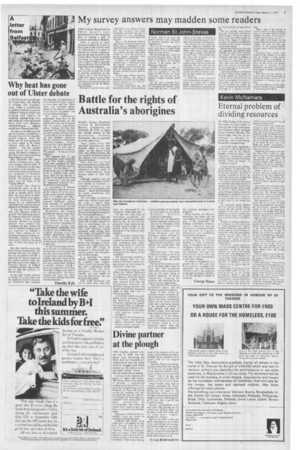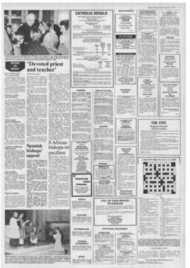Page 3, 11th February 1977
Page 3

Report an error
Noticed an error on this page?If you've noticed an error in this article please click here to report it.
Tags
Share
Related articles
The Surveys Commissioned By The Catholic Herald In...
Learning From The Differences In Irish And British Opinions
A Family's Opinions Of Our Survey
Now We Have A Picture Of You
Catholic Herald Gallup Poll Survey
My survey answers may madden some readers
Norman St John-oStevas THE Catholic Herald and its Editor deserve congratulations on the excellent idea of having a poll of Catholic attitudes in Britain.
After a period of rapid change in religion which has not been seen in this country since the Reformation it is good to attempt an interim assessment, and we all look forward to the results which should be helpful providing we remember the wise words of Walter Lippman that a poll is not the end but the beginning of the argument.
The survey is a public service then, but also a private one, a kind of personal examination of conscience and I was horrified to realise how long it is since I have been to a retreat and how my resolutions for planned giving have all evaporated into the air. Memo: must do better I Reading through the survey after I had filled in the answers I. found that my answers had been reasonably consistent and that in ecclesiastical and theological questions I 'find myself slightly left of centre.
Thus, in the liturgical section I came down in favour of variety and choice and an adaptation to new ways. Participation at Mass is essential, for after all it is a communal not a private act; but I feel there should be room for periods of private prayer, especially after receiving Holy Communion. I favour, too, choice between different rites — Tridentine, Latin and English. Communion in the hand appears to me to be desirable both on theological and sanitary grounds, but here again let there be choice.
I like the Sign of Peace and miss it at the Oratory, into which I sometimes scuttle for evening Mass, and am grateful for the "with it" Jesuits of Farm Street.
I would rather have the old ritualised embrace than the shaking of hands, and if you know the person next door to you or discover an attractive creature why not a smacking kiss?
Why not use the dunce also? It had a brief season in South Wales among children, only to be stamped out by episcopal decree, On lay participation, I fear, far too little has been done. I do not blame the clergy for this entirely, or even in the main; the principal adversary is the apathy and indifference of the laity.
Another difficulty is that unrepresentative zealots tend to take over lay organisations like the zealots of the Justice and Peace Commission who certainly do not represent English Catholic public opinion.
We still lack a properly striclured national Catholic body and fear the good old Catholic Union cannot fulfil the need. I admire the efforts of the Duke of Norfolk to carry out a transubstantiation, but it may well be beyond even his genius.
Yet it is not only in lay participation that things have stagnated; the same is true of all those movements bright with promise which sprang into being as a result of the Second Vatican Council. How pitiably slow has been the progress of the ecumenical movement!
Here the Catholic bishops are largely to blame for the tortoise-like approach. The laity (with minority exceptions) have welcomed the ecumenical revolution of the Council with a marked enthusiasm but it has not been guided into constructive channels.
I would like to sec occasional inter-communion accepted as a matter of course and a much greater determination to achieve unity in our lifetime. Ecumenism in its true sense entails no loss of iden
tity: it is in practice all gain and no loss.
The one igniting spark comes from the Charismatic Movement, which so aptly reflects the religious thrust of our time. What people are asking from religion is direct experience of the Divine and this they can find through joining or forming a Charismatic group.
Interest has shifted away from the old arguments and disputes about authority and organisation towards the prayer and contemplation which lie at the heart of religion. It is rather like the shift in the educational world where people are more concerned today about standards than systems, and the latter are only important in so far as they promote the former.
And talking of education reminds me how I filled in the section on Catholic schools. A Catholic school is on the whole to be preferred, but I make an exception in the case of Eton, where the Catholic boys enjoy the freedom for which the school is famous and also have the advantage of a chaplain of their
own.
When I got to the section on causes, I let fly a volley of ticks. I seem to have spent most of my life fighting for causes of one kind or another. most of them lost ones.
The right to life heads my list, closely followed by freedom of con science; the only one that gets nowhere is the anti-pornography crusade, about which I do not care much.
Vocations have clearly been eroded by the changes of the times and the failure to adapt quickly enough to them. Accordingly we have had the worst of all worlds. Until we get rid of our celibacy hang-ups in relation to the priesthood and allow a free choice to be made, vocations will continue to decline.
Well, there are my answers, or some of them, and I can already see maddened readers rushing to their typewriters or drawing out their pens.
As to my favourite feature in the Catholic Herald I had no hesitation in nominating John Ryan.
blog comments powered by Disqus









